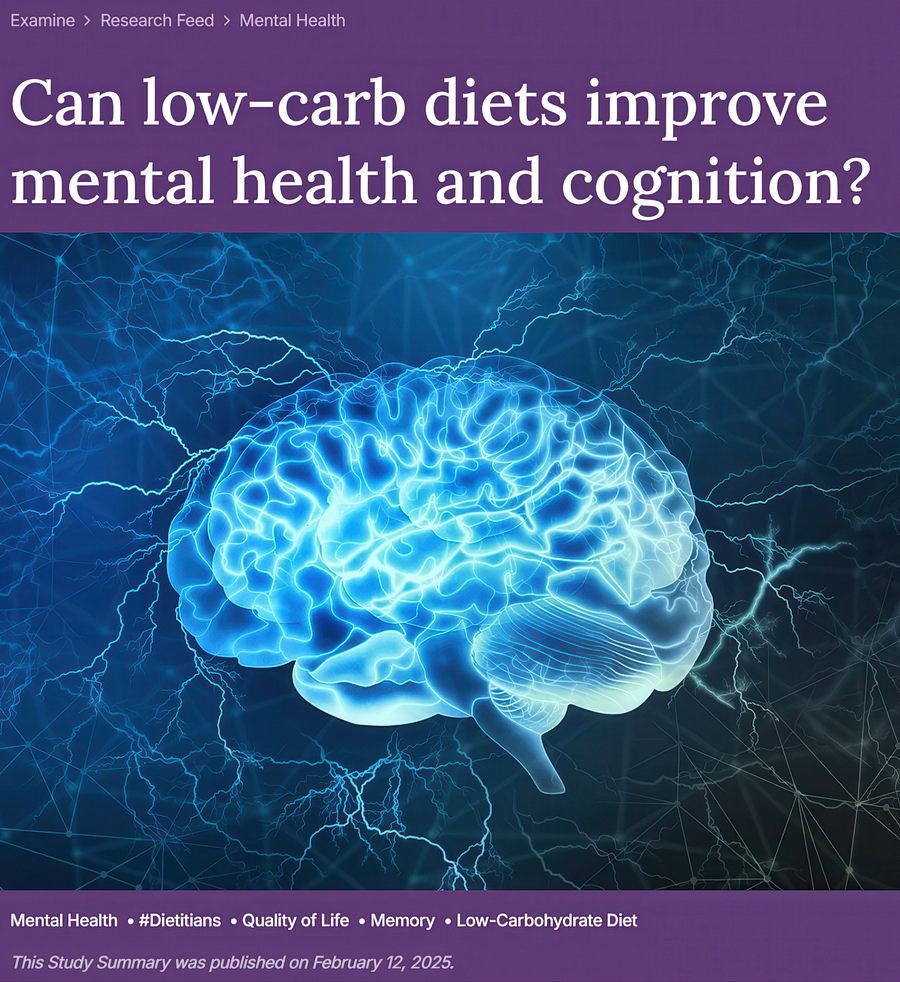Yet again we’ll return to Examine.com and take a look at a meta-analysis of extremely poor studies and trials on “low-carbohydrate” diets and improvements on quality of life (QoL,) and cognition.
Quick Summary
“In this meta-analysis of 30 randomized controlled trials in 1,781 adult participants, researchers looked at a low-carbohydrate and improvements in mood, anxiety, or memory speed, but its effects varied depending on individual characteristics and contexts.”
There are a few crucial things to consider whenever these imbeciles conduct a trial or study they refer to as “low carbohydrate.” First, there is no such thing as “low carbohydrate,” there is either toxic and useless carbohydrates in the diet to such an extent that your body has to fight unnatural blood glucose levels to such a degree that our natural fat metabolism and ketosis is shut down and instead we run on a very unnatural and damaging glucose metabolism, or the diet only contain a few trace amounts of glucose and we run on our natural fat metabolism, as in being in ketosis. There is no “in-between.”
Usually, the cut-off for being in ketosis and running on our natural fat metabolism is around 20 to 30 grams of carbohydrates a day maximum, but preferably it’s less than half of that. If we were to count non-existing and pseudoscientific “calories,” that would mean that in a standard 2,000 kcal diet, carbohydrates would have to be less than 4% of the energy, preferably less than 2%!
A “low-carb diet” is defined as less than 30% or 26% of imaginary “calories” from carbohydrates, which is nowhere near 4%! At 26% or even 15% carbs you will still run on a glucose metabolism as you will not enter ketosis.

The second big thing to consider is that pretty much everyone in today’s society has been deceived and brainwashed into consuming carbohydrates since childhood and has thus damaged their bodies and metabolism to various degrees. Usually, once you switch over to a natural diet, as in less than 10 grams of carbohydrates a day (less than 2% of total energy,) it takes at least 6 weeks or more for our natural process of producing glucose, gluconeogenesis, to come back, and until then, you will feel really awful and perform quite badly. And also, it will take at least another 6 to 12 weeks before your body has become efficient at using fatty acids as fuel — to such a degree that you feel ok. So, you will not notice any kind of improvements in most measurable things until after at least 12 to 18 weeks or more — especially not in physical performance. Actually, a damaged metabolism can take 6 to 12 months to repair or more. And then we have detoxification and tissue healing, which will kick in as you finally removed the extreme toxic load of unnatural elevated blood glucose, including all the toxins that are prevalent in foods with carbohydrates, such as antinutrients, defense chemicals, heavy metals, pesticide residues, and added food chemicals. Both detoxification and healing will interfere with all other improvements as they will contribute to fatigue and lethargy.

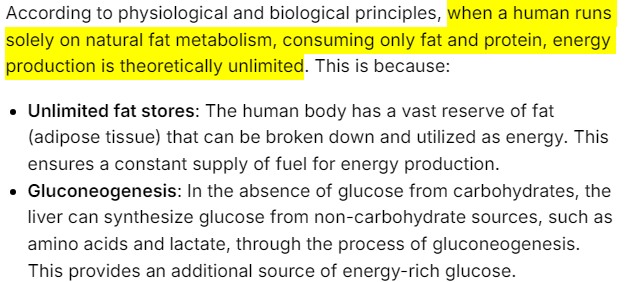
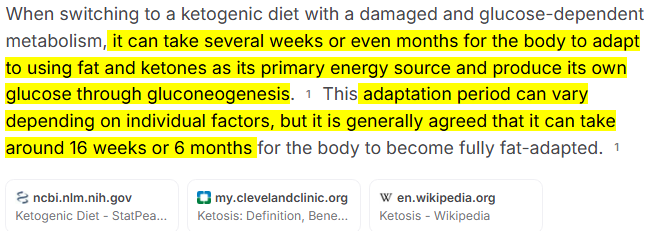
However, all these steps and hurdles are necessary to reclaim your health and wellbeing, improving your physical and mental performance, as well as greatly extending your lifespan.
A few months or even a year of feeling a bit worse is nothing compared to all the years you have been abusing your body and all the years you now have in front of you where you will be the best version of yourself, outperforming your old self in every single aspect.


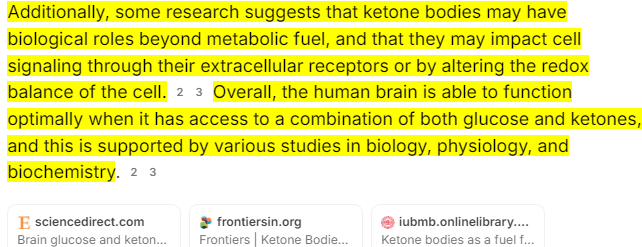

So, all this means that in order to actually perform a study on what would be called a “low carb diet,” you first need to make sure that the participants switch their metabolism from mainly glucose to fats, which requires less than 4% of total energy from carbohydrates, as in less than 20 grams a day, preferable half of that. And then you have to make sure that they stick to that for at least 6 months, preferably a year. After that, you can start to evaluate outcomes.
This is also true for any kind of study on different metabolisms and how they impact performance or any other physiological trait. And as we know, anyone on a natural fat metabolism will outperform anyone consuming carbohydrates in anything. However, this will only be evident once you are fully fat adapted and have detoxed and healed your organs and other crucial tissues. And that can take anywhere from 6 months to several years depending on your age and level of damage from your previous carbohydrate dominant diet.
All this should be common sense, and all of it is also very well documented in physiology and biochemistry. There are no excuses if you happen to work in the field and do not understand these very simple basics. So, these “researchers” should probably go back to working at McDonalds or to cleaning toilets, which should be more suitable for their limited expertise.
Key study details
“Overall, a low-carbohydrate diet — defined as 35 percent or less of energy from carbohydrates — did not improve mood, depression, or anxiety.”
For f**ks sake! What did I just explain, you imbeciles?
35 percent? Are you mad? In a pseudoscientific “2000 kcal” diet that would be a whopping 175 grams of carbohydrates a day. That’s a hell of a lot of toxic crap that will have your blood glucose riding a roller coaster all day. Insanity! How the hell can you call that “low carb.” 175 grams is nowhere in the ballpark of 20 grams. It’s almost 9 times the amount!

Again, this is the sad state of nutritional pseudoscience. Pathetic!
Off to the toilets, you scoundrels!
“However, the effect varied widely depending on the participants’ characteristics:
- A low-carb diet improved quality of life in participants with neurological conditions, based on 6 studies.”
And guess what you forgot to mention? These studies actually had the participants consuming less than 15% of their daily energy intake from carbohydrates. As in less than 75 grams of carbs a day on a pseudoscientific “2000 kcal” diet. Still, that is way too much toxic carbs to switch to our natural healing and beneficial fat metabolism and reaching ketosis, but it’s a big reduction in toxins that otherwise is present in these carbohydrate-containing foods. So, this improvement in QoL simply came from lowering the toxic load on the body. Still, the results would have been mind-blowing if they actually went zero-carb!

- “Eating a low-carb diet for more than 120 days resulted in a slight improvement in anxiety symptoms, based on only 2 studies.”
These studies also followed a diet with less than 15% carbohydrates. But again, it’s still too much carbs and you will not reach ketosis or tap into our natural fat metabolism. However, it is less glucose than the body requires, especially if you move around a little, so this “low-carb diet” will at least stimulate the body to re-activate gluconeogenesis and produce some of its own glucose again, as it is supposed to. Still, it’s a far cry from following our natural diet and being in ketosis and letting our bodies manage our glucose production based on our needs.


- “A decline in memory speed was noted in older adults (ages > 55) when eating a low-carb diet, based on only 2 studies.”
Yes, not surprisingly, as less than 15% carbs are still too much and keeps you out of ketosis and a fully functional gluconeogenesis, but still too little to supply all the glucose the body will need, so it will be “trapped” between two types of metabolisms, not fully utilizing any of them. And even worse, at an age above 55, most people today have severely damaged metabolisms, so the body being forced to go back-and-forth will be very difficult and demanding.

The constant addition of carbohydrates throughout the day will hinder the body from switching to ketosis and utilize ketones and fatty acids effectively as fuel, while also interfering with gluconeogenesis (which will only “kick in” once glucose levels are at normal again.)

This is yet another example why there is no such thing as “low carb.” Either you consume carbohydrates to cover you energy needs and accept the extreme damage being caused to your organs and soft tissues, the accelerated aging, and the fact that you will perform worse than if you were to run on a fat metabolism, or you remove all carbohydrates and let your body run as intended and reap all the benefits.

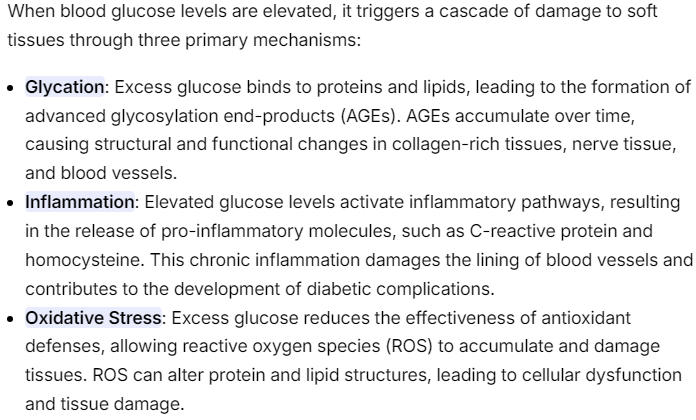
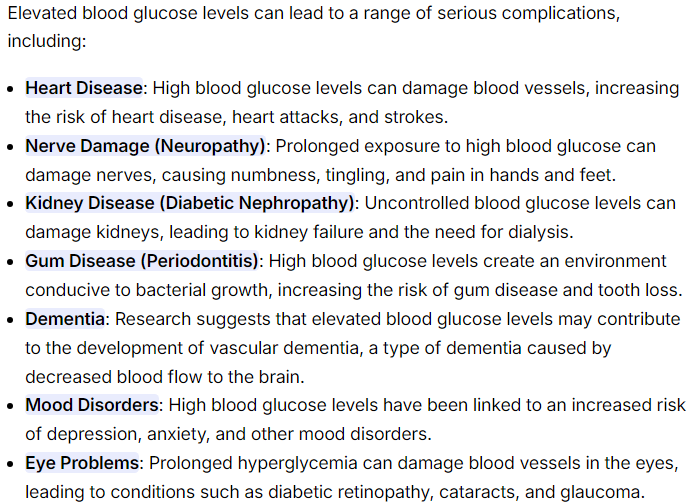

And yes, only a complete fool who desires to sabotage him- or herself while digging an early grave would choose carbohydrates. But the indoctrination, the conditioning since early childhood, the brainwashing is strong in most people, not to forget that they are a toxic mess because of their abysmal food choices and that means a damaged brain as well.
They might think that they are healthy and perform well, but they have never experienced true human performance, as in following our natural species-specific animal-based diet, as in being fully nourished, having a very low toxic load, and running on our natural fat metabolism. It’s like night and day, but they have no clue because they have never experienced it (and that includes pretty much all “researchers” and “scientists” as well. Keep that in mind!)
Examine’s take
“This study showed that a low-carb diet is not a universal solution for improving mental health; its effects are highly context dependent. These findings underscore the importance of tailoring diets to the unique needs and goals of each person. Personalization is key to maximizing benefits and addressing the specific challenges of individual circumstances.”
No, this shows that you and the extremely retarded and backwards research community within the pseudo scientific field of “nutrition” has no clue about anything. None of these approaches were “zero carb,” which is the only way to switch to our natural fat metabolism. And this is probably why they continue with the “low carb” nonsense, since they know that “low carb” is not enough to reach ketosis and our natural fat metabolism, as in where people actually get healthy and begin to perform far better than before. So, by using this silly “low carb” label, they can make anything “low carb” look bad, as most brainwashed people actually associate “low carb” with ketogenic diets or our natural animal-based diet, which of course is totally wrong.
So, in this sense, they are really sneaky and evil bastards, doing everything to cover up our true natural diet and our true natural state of ketosis and that we are physiologically built to be running on fats, as in saturated fats — just like every single mammal.
And also, there is no such thing as “personalizing” a diet outside the context of our natural species-specific animal-based diet. Every single human is part of the same species, a species that only has one single physiological correct diet — and that diet is totally void of carbohydrates and only includes animal-based foods. You can only “personalize” it in the context of food choices among animal-based sources, protein to fat ratio, meal-planning, meal-frequency, and lifestyle factors — and that is what I do with my clients, as well as educating them so they can flourish on their own.



If you need help with any kind of health problems or transitioning from your current way of eating to our natural species-appropriate, species-specific way of eating, I’m available for both coaching and consultation.
Coaching and Consultation
And if you found the article and my insights helpful and enjoy my daily free information, please consider donating to help pay the webhosting bills and keep the site running. And if you’re interested in discussing and sharing information with likeminded people, consider joining our uncensored community at Ungovernable.se. Thank you!

